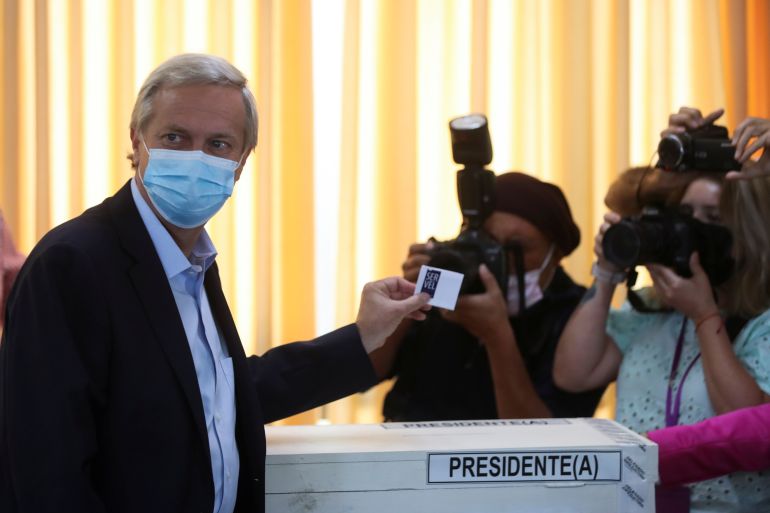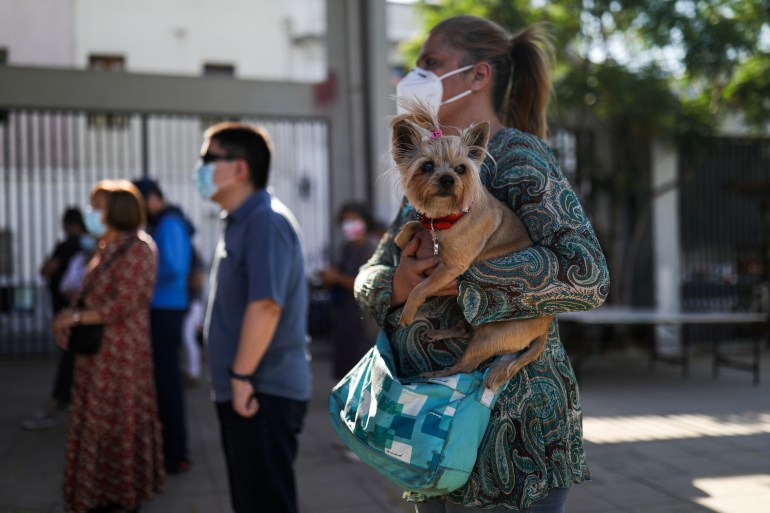Chileans vote for new president to lead transition period
A runoff election between left-wing and far-right frontrunners is expected but not a given.

Antofagasta, Chile – Voting has started in Chile for a new president in a critical election that will determine governance during a post-crisis transition period.
Polls opened at 8am (11:00 GMT) and are scheduled to close at 6pm (21:00 GMT) on Sunday.
Keep reading
list of 3 itemsPolitical shake-up on the horizon as Chile to elect new president
Chile: Lower house approves Pinera impeachment trial
Seven presidential candidates are on the ballot. Results are expected later on Sunday and the winner will be in power for a referendum on a new constitution currently being written by elected citizen representatives.
The constitutional convention was a concession to mass protests against structural inequality during an explosion of social unrest that started two years ago.
Gabriel Boric, a 35-year-old congressman and former student movement leader, represents the left-wing Apruebo Dignidad coalition, while Jose Antonio Kast, a 55-year-old lawyer and former congressman, is the far-right candidate of the Christian Social Front coalition.
Sebastian Sichel, a former official in outgoing President Sebastian Pinera’s administration from the centre-right ruling alliance, and Yasna Provoste, a senator representing centre-left parties, who trailed Boric and Kast by a substantial margin, round up the field with three other candidates.
No candidate is expected to obtain an outright majority. The top two contenders will face each other in a December 19 runoff.
The president-elect will take office March 11, 2022 for a four-year term.
“There’s going to be a need to support this transition and this new constitution,” said Federica Sanchez Staniak, a political science professor at the Alberto Hurtado University in Santiago and a member of the Red de Politologas network of women political scientists.
Voters are also electing all 155 members of the lower house of Congress to four-year terms, 27 of 50 senators, and regional council representatives.

Streets in front of local schools used as polling stations are closed to traffic, but few people were casting ballots within the first hour of voting.
Many people opted to wait because if a volunteer registered to staff a polling station does not show up, the first voter in is obligated to take their place for the day and only seniors can opt out.
Gloria Alliu, 57, part-owner of a bakery, plans to vote later in the day but she is still not 100 percent sure which presidential candidate she will choose.
“A lot of people are undecided,” Alliu told Al Jazeera. “There is no one candidate that encompasses all of my interests.”
Alliu said equality, poverty, employment and people’s rights are all important to her and she will discuss with others to make up her mind today.
“No one is really sure what the results are going to be,” said Sanchez Staniak. “It’s very hard to predict.”
A December runoff between Boric and Kast seems the most likely outcome but there is always the possibility of a surprise, said Sanchez Staniak.
Polls have been under scrutiny and Kast did poorly in the last debate, she noted.
“I think that turnout will most likely be average,” added Sanchez Staniak, predicting that the turnout will be between 43 and 48 percent as it has been in the past two first-round presidential elections, ever since mandatory voting was eliminated.
“The general behaviour of the Chilean electorate is not turning out.”